
envision Imagining Possibilities | Creating the Future | University of Idaho College of Education | Fall 2012 The Best Prepared Recreation Professionals in the Nation
Table of Contents
Fall 2012
Editor/Writer
Cheryl Reed-Dudley
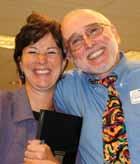
Contributing Writers
Julie Stafford Son
Susan Houge Mackenzie
Lydia
Tami Goetz
Marie Beyerlein
Mary Gardiner
Jamie Esler
Susan Stuntzner
Ryan Howe
Beth Cunningham
Michael Highfill
Creative Director
Julene Ewert
Photographs As credited
College of Education
875 Perimeter Drive MS 3080 Moscow, ID 83844-3080
astormo@uidaho.edu
For the most current news and ongoing events, go to www.udiaho.edu/ed.
The University of Idaho is an equal opportunity/ affirmative action employer and educational institution. ©2012, University of Idaho. envision magazine is published by the College of Education for alumni and friends. Published two times a year, the magazine is free to alumni and friends of the University. Send address changes to: 875 Perimeter Drive MS 3080, Moscow, ID 83844-3080. Send information, Class Notes and correspondence regarding alumni activities to: Allison Stormo, College of Education, University of Idaho, 875 Perimeter Drive MS 3080, Moscow, ID 83844-3080. (208) 885-6386, E-mail: astormo@uidaho.edu, www.uidaho.edu/ed
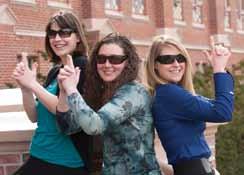
Letter Policy
We welcome letters to the editor. Correspondence should include the writer’s full name, address and daytime phone number. We reserve the right to edit letters for purposes of clarity or space.


DEAN’S MESSAGE 1 Corinne Mantle-Bromley FEATURE 2 The Best Recreation Professionals STUDENTS 6 Liz Russell: PTE Teaching Internship 8 Lydia Marie Beyerlein in Honduras 10 Snow Research PROGRAMS 11 Expanding Rehabilitation Counseling FACULTY 12 Transforming Leadership STAFF 14 Jody Sharp Retires 14 Lauren Bowersox ALUMNI 15 2012 Graduation 16 Perrigot Has Gone the Extra Mile 18 Overcomers – Joe and Cindy Grover 20 Milken Award Goes to Brady Dickinson 21 Alumni Notes DEPARTMENT & CENTER NEWS 24 Curriculum & Instruction 26 ETHICS 27 Leadership & Counseling 28 Movement Sciences 29 TRIO DONORS 30 John and Karen Rosholt LOOKING BACK 32 Remembering Edith Betts Cover: Tami Goetz, Susan Mackenzie Houge and Julie Stafford Son Photograph by University of Idaho Photo Services
envision 12 32 28
2
From the Dean’s Desk

Dear College of Education Friends,
Our current student and alumni successes make us very proud. I am daily reminded that we work with incredibly bright, committed, and forward-thinking students who go on to lead the state and beyond. School superintendents, principals and teachers from the University of Idaho help to ensure that our K-12 schools have strong leadership. And the quality of our athletic trainers, dancers, recreation, exercise, and sports science majors are making a positive difference in communities across the country.
Pride in our efforts also extends beyond the accomplishments of our students and alumni. Our faculty are successfully receiving major national funding for their research, collaborating with school and community members, and working closely with current students to ensure they reach their potential. You’ll see in this issue of Envision some of the reasons for our pride in our students, alumni, and faculty members.
You’ll read about two of our students’ very different teaching intern experiences: one in a professional-technical school in Idaho, and one in South America. You’ll also read about the expansion of our rehabilitation counseling program and important research conducted by our new recreation faculty. You’ll find out about our faculty and staff who are retiring and those who are moving on to other opportunities. You’ll read about one of our alumni’s very unique challenges and teaching experiences, and what makes him so proud to be a Vandal.
In April the University of Idaho kicked off a large fundraising campaign, and we’re confident that we’ll reach our goal because of you. We are very humbled by your generosity. Those of you who are able to contribute to our work are helping us fund current students and contribute to our faculty members’ abilities to compete at national funding levels. Your continued interest in and support of our work makes what we do possible. We excel, in part, because of your generosity.
Our hope in reading Envision is that you share the same pride we feel in our current students, you – our alumni, – and our ongoing efforts to serve as Idaho’s education leaders. Together we make this goal a reality.
Sincerely,
Corinne Mantle-Bromley, Dean

Fall 2012 1
The Best Prepared Recreation Professionals in the Nation

FEATURE
The University of Idaho has one of the best outdoor settings for earning a degree in recreation. Not only that, the program’s partnerships with the National and Idaho Recreation and Park Associations as well as community partnerships provide students opportunities to interact with professionals in the field and get hands-on learning experiences. Combine those characteristics, along with the leadership of faculty Julie Stafford Son, Susan Houge Mackenzie and Tami Goetz, and you have a dynamic program poised to graduate the bestprepared recreation professionals in the nation.
Research Projects
STEM-HAL interdisciplinary project
American youth are facing challenges in both physical health domains (e.g., obesity) and science, technology, engineering, and mathematics, or STEM, education achievement. The College of Education and College of Natural Resources researchers addressed both issues by piloting a weeklong study of an Adventure Learning - based GreenSTEM curriculum with Coeur d’Alene high school students. The Coeur d’Alene students visited McCall Outdoor Science School, or MOSS, for a week in March to learn about snow science and climate change through outdoor adventure learning activities. Adventure Learning programs engage students in exciting, science inquiry - based outdoor experiences and use the Internet to facilitate communication and interaction regarding those experiences. These programs have been found to motivate students and inspire meaningful collaborations and inquiries for students and teachers.
Findings will provide practical direction for future program development in Idaho schools that effectively explores the intersection of healthy outdoor activities and STEM. This project is still underway; however, preliminary data analyses indicate that students participating in the residential science school walked an average of three miles more per day while engaged in the adventure learning program. Students also reported increased engagement in science and physical activities due to the low student-teacher ratio, hands-on applied science projects, and learning new and interesting outdoor activities.
Students reported that they intended to increase physical activity upon completing of the program and to try new and different physical activities like snowshoeing, cross-country skiing, and snowboarding. Teachers involved with the project
also reported learning new ways to engage students in science curriculum and the desire to use outdoor learning activities in the future to engage students in science topics.
Faculty and staff working on this project include Susan Houge Mackenzie and Julie Stafford Son (REC), R. Justin Hougham and Brant Miller (C&I), and Karla Eitel and Gary Thompson (MOSS).
Improving the scholarship of adventure and outdoor recreation
Susan Houge Mackenzie has been working to improve the scholarship of adventure and outdoor recreation through a range of research projects. Recently completed projects included the use of head-mounted cameras to study optimal adventure experiences; the motivations and emotions involved in adventure; and investigations of adventure tourism in South America. These projects have resulted in high impact publications within the field of recreation in the Journal of Leisure Research, Qualitative Research in Sport, Exercise and Health, and Psychology of Sport & Exercise.
Susan’s current projects focus on the psychological aspects of recreational and competitive climbing, and using adventure activities to engage youth in STEM education and physical activity. She received a 2012 University of Idaho seed grant to investigate indigenous perceptions of adventure and adventure tourism with Māori (indigenous people of Aotearoa, New Zealand). This project will employ a Kaupapa Māori research paradigm to investigate Māori perceptions of adventure; values and benefits associated with adventure; and representations of Māori culture within adventure tourism. It is hoped that this project will inform University of Idaho recreation and leisure
Fall 2012 3
curriculum regarding indigenous perspectives of recreation. Service and outreach projects should also be strengthened as a result of this project as Susan sits on the Idaho Recreation and Tourism steering committee and the newly appointed U-Idaho International Engagement Advisory Council.
Our Recreation Professors
Julie Stafford Son, Program Director

Julie loves to teach others about the importance of recreation and parks for enhanced quality of life. She currently teaches recreation master of science graduate courses in the Movement and Leisure Sciences Program. Students’ final projects include grant proposals to enhance health through recreational activities. In the Policy Analysis & Historical Aspects of Parks and Recreation class, Julie likes to challenge her students to investigate the roots of the field and the policies that influence recreation and park resources and management.
Her Background
Julie graduated from The Pennsylvania State University with a doctorate in leisure studies, and then held a faculty position at the University of Illinois for five years. Prior to that, she worked at the Center for Aging at the University of Nevada conducting programs and research with older adults. She has worked in an array of recreation and park settings with various populations including providing therapeutic recreation to children with disabilities, camp counseling, coaching youth sports, engagement on university health promotion initiatives, assisting American Indian tribal organizations in addressing recreation and health issues, rural recreation and tourism, and recreation-based health and wellness programs for older adults.
Her Interests
Julie’s background and interests on healthy active lifestyles across the lifespan have led to collaborative partnerships on solution-oriented projects with a wide array of organizations, businesses and communities. She also stays active in several professional organizations. Recently, she co-presented with a graduate student on rural active living constraints and facilitators at the National Recreation and Park Association annual meeting in Atlanta, and chaired symposia on physical activity and health at the Australian and New Zealand Association on Leisure.
She recently published two articles with colleagues from across the country on community readiness for healthy leisure in a racially diverse rural community, and on the use of strategies to continue desired leisure activities despite arthritis pain.
Tami Goetz, Instructor
Tami believes in the importance of invested field time to experience and grow as a student and recreation professional. She earned her master’s degree in recreation from the University of Idaho and her doctorate in Minnesota, then returned to the University of Idaho as a lecturer in 2009. She teaches a majority of the undergraduate courses currently offered to recreation majors, and three courses in the Movement Sciences master’s program. Many of her courses place students in the community to provide programs, lead, and serve people of all ages. This spring Tami facilitated 140 students to provide programs in surrounding communities.
Her Background
Tami has a rich perspective of the recreation program and appreciates the culture and history behind it. She was a student of Professor Mike Kinziger (retired 2009), who inspired and helped prepare hundreds of recreation professionals across the region. In fact, Kinziger led Goetz in several outdoor adventures, including mountain biking Moab, Utah trails; backpacking the Beartooth Mountains, Wyo.; paddling a variety of regional rivers; and camping under clear, starry skies in Idaho’s backcountry. As an undergraduate, Goetz found her passion for outdoor recreation while taking U-Idaho recreation classes. Tami enjoys teaching for her alma mater, and has many fantastic memories of the recreation program.
Her Interests
Tami will be leading a wilderness immersion backpacking experience in the Selway-Bitterroot Wilderness Area for recreation practicum students. She also is working with Moscow School District’s Adventure Club staff to support recreation and physical education students. Students are working with Tami to complete the study as a major assignment for Health, Physical Education, Recreation and Dance 581 group research.
Tami plays coed hockey during the winter season, and is involved with the Ice Rink Expansion committee. She was also co-adviser of the Recreation Student Organization with Julie Stafford Son for 2011-12.
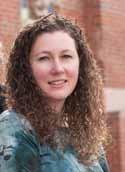
FEATURE
Julie Stafford Son, Program Director
4 envision
Tami Goetz,Instructor
Susan Houge Mackenzie, Assistant Professor

Susan’s interest in sport and adventure activities stems from nine years of riverboard (hydrospeed) guiding in areas of New Zealand, the U.S. and Chile, and competing in the New Zealand National Women’s Soccer League.
Her Background
Susan recently moved to Idaho from New Zealand, where she worked for 10 years in the adventure tourism industry and taught a broad range of courses in Adventure Tourism Management, Outdoor Education and Adventure Recreation, and Indigenous Tourism.
She also recently provided risk management consulting to a tour operator in the Galapagos Islands and contributed to the New Zealand Ministry of Tourism’s nationwide review of the adventure tourism industry and risk management practices. Susan has served on the executive board of the New Zealand Whitewater Boarding Association and has industry experience leading Spanish language tours in New Zealand and Cuba, and developing mental skill training workshops for elite youth soccer players and multisport athletes on behalf of Sport Otago in New Zealand.
Her Interests
Susan’s research employs mixed methods, such as survey measures combined with qualitative interviews to study psychological experiences of adventure across recreational, tourism and educational settings. This line of research is grounded in the belief that engaging in outdoor physical activity is essential to health and mental well-being and can provide a profound sense of meaning and purpose to everyday life. The results of her research have been published in leisure, tourism and psychology journals.
Susan is also a faculty adviser for the women’s and men’s club soccer teams (as well as a player) and served as a faculty adviser and volunteer on the U-Idaho Alternative Spring Break service trip for students. She has organized visits from the National Outdoor Leadership School, or NOLS, that included guest lectures, student lunches/dinners, and meeting with faculty and campus recreation to promote student learning and development opportunities within the recreation field.
About our Recreation Program
A bachelor of science in recreation from the University of Idaho prepares students to lead public and private programs that are designed to encourage active lifestyles. As a graduate of the only accredited recreation program in the state and one of only three in the Pacific Northwest, students will have the credentials needed for national certification, and the expertise and training to improve the health of people of all ages.
With this nation’s increasing overweight and obese population, an active lifestyle is more crucial than ever. Students in the recreation program develop the specialized skills and knowledge to help people increase their fitness level and become healthier. They will learn to organize and schedule activities to maximize the use of facilities and monitor sites, oversee recreation activities for different age groups in a variety of settings, and direct programs that help people make good choices in using their leisure time.
With its outstanding outdoor recreation and resources, Idaho offers one of the best settings to earn a degree in recreation. The University of Idaho’s active partnerships with the National Recreation and Park Association and the Idaho Recreation and Park Association provide students the opportunity to interact with professionals in the field and learn firsthand about current practices. This hands-on approach helped the University of Idaho receive recognition by Outside Magazine as the 23rd best site in the United States to minor in outdoor recreation, the university’s most popular minor.
What Graduates Can Do
With a bachelor of science in recreation, students can pursue a career as a:
• Recreation director for cities and communities
• Director of campus recreational facilities
• Activity director for cruise ships or resorts
• Administer after-school programs
• Activity director for a senior center
Graduates may also pursue a master of science degree in movement and leisure science, which allows for joint minors in outdoor recreation leadership and sustainable tourism and leisure enterprises. This program helps students develop advanced skills, tools and the philosophy to be servant leaders in organizations related to physical activity, sports and recreation.
Susan Houge Mackenzie, Assistant Professor
Fall 2012 5
STUDENTS
Agricultural Education: From Welding to Food Science and Beyond
Student Liz Russell’s Student Internship in Meridian
By Cheryl Reed-Dudley
When one of Liz Russell’s students got excited because he received a 95% on his weld bead, Liz knew she was in the right profession. Agricultural education fits her – even though instructing a group of younger students in welding made her a bit nervous at first.
Liz, as a student, taught several classes last semester at Meridian High School’s new Professional-Technical Center. About three years ago, Meridian began a Magnet Program, which busses students to their new PT Center from four area schools. The program offers specialized, hands-on courses.
“Each of my classes had about 30 students, and I taught 90-minute blocks,” said Liz. “It took time to learn how to teach such young students in the welding class. I gained a real appreciation for teachers who have that age group all day long.”

6 envision
Liz thought that her students would have some knowledge about agriculture, not realizing that she was teaching in a more urban area where students don’t grow up with that basic know-how. “I needed to re-evaluate my teaching and start at square one with them. It turned out to be really interesting,” she said. “It was a really good thing because everything we did in class was all new to them, and they loved it. They were never really bored.”
Liz also taught a couple of senior level classes – one a veterinary technician course, where the students earn a certificate worth credits that will help them further their education at the college level. “We went to the equine center and the veterinary hospital, and got plenty of handson learning,” said Liz. “It opens their eyes. But sometimes when students see a surgery, they decide they don’t want to do it. It’s good that they’re learning now!”
The second senior level class Liz taught was food science, a dual credit class co-taught with University of Idaho Professor Jeff Bolscheid. “He taught part of the class and I taught some of the lab. No one here has taught that class, so it’s definitely been a challenge.”
What is the Magnet Program?
The mission of Professional-Technical Education (PTE) in the Meridian School District is to provide youth with the technical skills, knowledge and attitudes necessary for successful performance in a highly effective workplace. ProfessionalTechnical (PT) Magnet Programs are high-end sequenced careertraining classes that lead to industry certifications and college credit, and feature internship experiences for students.
The welding class Liz taught really drove home why the professional technical classes are so important. “The handson really clicks with them,” she said. “They get excited about their projects, and the shop is so new and well kept that the students take a lot of pride in it and they understand how they’re expected to act there. Some kids don’t do well in a typical school setting, so these classes give them an opportunity to excel.”
Why Ag Education?
Liz grew up on a dairy farm in Emmett, Idaho, where she learned a strong work ethic and nurtured an interest in all things agriculture. She thought she might want to be a teacher, but by the time she was a senior in high school, she still wasn’t sure. When her high school agriculture teacher told her about agricultural education not long before she graduated, she knew it was the right fit for her.
She chose the University of Idaho because she knew it had a prestigious agriculture college. Also, she said, “When I was involved in FFA in high school, the state contests were in Moscow, so I had been to campus three or four times and had a chance to meet some of the professors. It was affordable, I got some scholarships, and I was still in-state, but far enough from home that I got an independent experience.”
Agricultural education is a mixed bag. Students take a broad array of classes to prepare to teach introductory courses in animal science, plant science, food science, mechanics, welding, and more.

“An ag teacher’s knowledge is a mile wide and an inch deep,” laughed Liz, who will be certified to teach grades 9-12.“We pretty much take classes from every department on campus.”
Liz has enjoyed the University of Idaho, particularly her time with Dr. Amin Ahmadzadeh, who teaches in the animal and veterinary science department. “He taught the reproduction class that I took as a freshman. I learned from him that you need to have enthusiasm and passion for your subject area. He also took the time to get to know everyone in his class – within a week he was calling everyone by their name, which was impressive given that it was a large class. He was my role model for a teacher.”
Teaching is so much work, but so rewarding,” said Liz. Since graduation, Liz has been hired to teach full time at Meridian High School.
Fall 2012 7
Liz teaching welding to her class.
Nuestros Pequeños Hermanos Honduras
A Student Internship in South America

STUDENTS 8 envision
By Lydia Marie Beyerlein
After a lengthy application process, Nuestros Pequeños Hermanos, or NPH, Honduras accepted me as their physical education teacher, which involved a 13-month commitment. The job at NPH Honduras became my internship to finish my degree in exercise science and health. I graduated from the University of Idaho this spring.
Nuestros Pequeños Hermanos (NPH) is a Catholic Church affiliated orphanage. NPH has homes throughout Central America and a few in South America. The orphanage gives children who come from extreme poverty, abuse, neglect and abandonment, a home, food, education, and love.

The schools educate the children in math, reading and writing, science, computers, religion, English, art, music and physical education. The goal of the school is to educate the children so they are able to move up into Tallers (7th-9th grade), where they continue their education and also learn a trade for part of the day. The children then have the opportunity to go to high school and even university.
My job required teaching 11 different 80-minute classes weekly. The students ranged in age from 2-15 years. The school provided adequate, though limited by U.S. standards, equipment and an outside auditorium to teach classes. There
was no structure or curriculum to follow, which allowed me the opportunity to be very creative. I developed a physical education curriculum for the school, which will provide future volunteers with lesson plan ideas and helpful suggestions. Due to my limited Spanish, despite a cram two-week course in Copan and two years of Spanish in high school, communication was difficult initially and it took some time for the students to respect me.
The program I developed includes cooperation, nonlocomotion, body space awareness, dodging and fleeing, fitness/relays and hand/foot/eye coordination. My classes were primarily organized around “games” that got all the students involved. These children come from incredibly deprived backgrounds, and for some of them P.E. is the place where they learn concepts of fair play and sportsmanship for the first time. Some games that seemed like they should work out well were a complete bust; others that I dreamed up on the spur of the moment in a panic turned into favorites.
Nuestros Pequeños Hermanos has been an incredible experience and rewarding in so many ways. I have learned how to work with difficult children. I have learned how to deal with culture differences and have had to deal with the struggles of language barriers.
I’ve worked hard for all of the relationships I developed at Nuestros Pequeños Hermanos, making them so much more gratifying. Probably most importantly, I have far more patience now than I ever have before. I put in many hours with the children and I hope I’ve given them an experience that they will remember with fondness. I know they have given me so much more.
Fall 2012 9
STUDENTS
Spring Break at Brundage U-Idaho Researchers Investigate Snow Science
 By Jamie Esler
By Jamie Esler
For spring break this year, 21 students from Lake City High School and Post Falls High School embarked on an Adventure Learning Expedition to the McCall Outdoor Science School, or MOSS, and Brundage Mountain Resort. Students spent the week working with an interdisciplinary team of University of Idaho researchers, MOSS field instructors, and LCHS/PFHS teachers to investigate snow/avalanche science and student physical activity in outdoor, experiential learning environments.
Students spent their days traveling by snowshoes, Nordic skis, and downhill skis and snowboards to dig snow pits and analyze snow layers, snow density, snow-water equivalency, and the effects of changing climate on Earth’s hydrosphere. During the last two days of the trip, students worked in their field groups to conduct inquiry-based investigations about snow and avalanche science.
Questions asked and investigated by student groups included:
• “How can the relationship between snow-water equivalency and snowpack depth model or predict precipitation in our region?”
• “How does elevation of a snowpack affect the snow-water equivalency of snow layers?”
• “How does the aspect of a snowpack affect the snow-water equivalency of snow layers?”
• “How can snow-water equivalency of a snow pack be used to predict the volume of water available to a watershed during spring melting?”
Participation in this expedition is expected to promote student engagement and motivation for both healthy outdoor activities and STEM (science, technology, engineering, math) topics. Findings from the University of Idaho research will provide practical directions for future program development in Idaho schools that effectively explore the intersection of healthy outdoor activities and STEM education.
University of Idaho researchers from the College of Education kept track of the Expedition Team’s journey using a daily Adventure Learning blog site. To see more pictures, read daily student reflections and narratives, see the slideshows of the student presentations, and learn more about Adventure Learning here in Idaho, visit the expedition blog: www.alatbrundage.wordpress.com
10 envision
By Susan Stuntzner
Meeting a Need: Expanding the Rehabilitation Counseling Program
The Rehabilitation Counseling and Human Services program, or RCHS, is a growing program at the University of Idaho.
Beginning this summer, the RCHS program is available to train students to become rehabilitation counseling professionals in both Coeur d’Alene and Boise. Presently, the RCHS program is CORE-Accredited.
Students within the program are expected to complete 60 credits of graduate level work within a two-year period. Graduates of the RCHS program are able to obtain their Certified Rehabilitation Counseling Certification, which is a national certification for rehabilitation counseling professionals. Over the past two years, graduates have done very well in meeting the knowledge-based criteria required to obtain the CRCC.
Susan Stuntzner
This summer the RCHS program is expanding to the southern region of the state in addition to its home base in Coeur d’Alene, due to the increased need for rehabilitation counseling professionals in that part of the state. With the start-up of the Boise cohort, the RCHS program is hoping to have approximately 25 students between the two locations.
Over the past year, the RCHS program has seen many changes. In addition to the expansion of the program and the opportunity for additional students and professionals across the state, the College of Education has hired two
additional faculty members. This winter, a half-time clinical faculty member, Beth Cunningham, was hired to recruit and coordinate services for the start-up of the Boise cohort. In addition, full-time tenured-line faculty member, Bryan Austin, was hired to join the RCHS program in August of 2012. Bryan will be teaching classes and working closely with students in the Boise area. Read more about Beth and Bryan’s work in the Department section of Envision.
Professor Susan Stuntzner is continuing with the rehabilitation counseling program in Coeur d’Alene. She is the Program Coordinator for the RCHS program and will teach classes and work closely with students in the Coeur d’Alene area. With faculty hired in both locations, the RCHS program is embarking upon a very exciting time, one in which trained professionals will be available to meet the diverse needs of persons with disabilities.
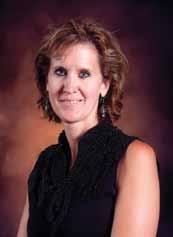
What is Rehabilitation Counseling?
As a whole, the rehabilitation counseling profession and its professionals provide counseling, adjustment training, and employment-related services to assist persons with disabilities in achieving personal independence, independent living, and employment. Rehabilitation counseling is a specialized profession where counselors are trained to understand the needs and concerns of persons with disabilities. As a part of their training, rehabilitation counseling professionals receive in-depth training pertaining to the needs of persons with disabilities.
The rehabilitation counseling profession is a field where graduates are able to interact with and influence the lives of persons with disabilities in many ways. Graduates of the program may assist persons with disabilities by counseling them through their coping with a disability process, assisting them in locating resources necessary for independent living, and providing services related to training and employment. In addition, employment opportunities for our graduates are numerous. Graduates of the RCHS program are able to find employment in public counseling agencies, state and federal agencies (i.e., Vocational Rehabilitation Division), private or nonprofit agencies, hospitals, correctional facilities, community mental health agencies, and private practice, and universities (e.g., Disability Services Office).
For more information about the Rehabilitation Counseling program at the University of Idaho, contact Susan Stuntzner at stuntzner@uidaho.edu, or (208) 292-1409.
PROGRAMS & OUTREACH
Fall 2012 11
Transforming Leadership With Social Justice
By Mary Gardiner
The social and cultural dimensions of leadership may be hidden, but they are powerful in their effects. Someone’s race, ethnicity, religion, gender, sexual orientation, nationality or disability impacts how they lead, and how they lead impacts the diverse students and families they serve.
Mary Gardiner, a faculty member at the College of Education’s Boise campus, brought her experience as a teacher and administrator and her preparation as an educational anthropologist (University of Virginia) into her work with U-Idaho to impact schools and community. She teaches graduate courses in Educational Leadership face-to-face and online with a goal of transforming leadership through social justice.
The 2012 Department of Leadership and Counseling signature research initiative extends Gardiner’s work in its focus on justice, leadership and organizational health.
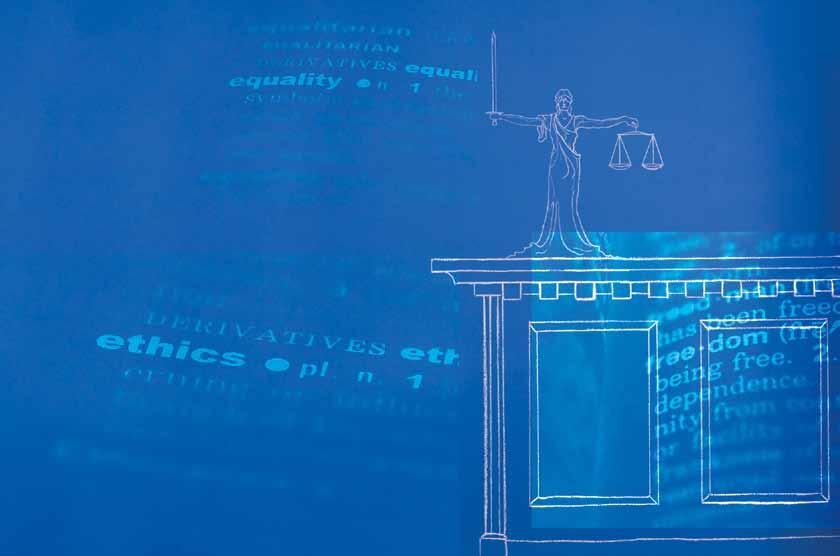
Justice is defined as promoting and protecting human rights and freedoms encompassing social justice and an ethic of care.
Leadership is defined as an influence relationship wherein leaders and their collaborators influence one another about real changes for the common good that reflect their mutual purposes (as cited in Brungardt and Gould, 2001).
Organizational health is defined conceptually as an organization that is whole, consistent and complete, when its management, operations and culture are unified with the ability of an organization to align, execute and renew itself.
Research has shown that an ethic of care significantly predicts transformational leadership. An ethic of care is consistent with inclusion and a social justice perspective. Mary’s work on leadership for social justice includes:
• School cultures
• Parent-school collaboration
• Mentoring women
• Urban school principals and their role as multicultural leaders
• Facilitating Latino student success
• Transforming leadership through a feminist lens
FACULTY
12 envision
• In collaboration with Canyon County Prosecutor Bryan Taylor, a former student in qualitative research, Gardiner studied adult learning experiences and has an article forthcoming in Journal of Practical and Clinical Law, Volume 13(3), June 2012. In this article, she discusses current and future work-inprogress.
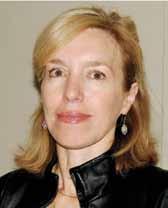
Emotion in Leadership
In the past, emotions in leadership were considered a liability. Emotions were to be controlled and contained if the leader was to be effective. In collaboration with Julie Yamamoto, assistant principal of Vallivue High School, and Penny Tenuto, assistant professor for the University of Idaho, Gardiner investigated emotion as a core practice of leadership. The resulting article, which includes a model of the processing of emotion by school leaders, will be published in an international, peerreviewed journal, Educational Management Administration and Leadership.
A New Supervision
As a mother of two teens, one of whom is African-American, Professor Gardiner knows the vital role that school leaders play in modeling and teaching anti-racism. Racism in schools arises from racism in the broader society. School administrators must assert leadership on anti-racism. In her research, in collaboration with a former doctoral student Alex Muzaliwa, Gardiner explored how a social justice lens can inform and revitalize traditional supervision practices. Her article titled Narrative Inquiry as a Culturally Relevant Supervision and Leadership Strategy for Social Justice has been selected for inclusion in the book “Defining Social Justice in a Global Context: The Changing Face of Educational Supervision” to be published by Information Age Publishing.
Narrative inquiry as part of leadership for social justice also has an essential role in creating the conditions for self-reflection, reflexivity, and analysis of one’s own life experiences, which are a precondition to not only leadership but also conducting rigorous research. Muzaliwa and Gardiner’s second inquiry titled Narrative Inquiry in Secondary Schools: An Exemplary Research Method for Social Justice Leadership has been selected for inclusion in the forthcoming book “International Handbook of Social [In]justice and Educational Leadership” (Sage Publisher).
Public Leadership
Research suggests that no single style of leadership is most effective; results are dependent on the leader, the followers, and the situation. We can learn a great deal, however, from in-depth case studies of situations, particularly of elected leaders such as state superintendents, and apply them in the leadership classroom. Researching a state superintendent’s leadership practice and applying it to theory has provided useful information for classes and discussion at the national level. Gardiner presented the results of her work-in-progress, Artistry in Leadership Practice: Narrative of Marilyn Howard, State Superintendent, Idaho, 1999-2007, to the annual meeting of the University Council for Educational Administration, or UCEA, in Pittsburg last November. She also presented the paper to graduate classes at the University of Idaho, Boise. The work is ongoing, and Gardiner has plans to generate research and mentoring for inclusive leadership in Idaho across gender, disability, and culturally sustaining leadership.
Gardiner’s work offers strategies to transform school climate and cultures, curriculum and instruction, policies and practices to ensure no child is left behind – not just in enhanced test scores, but in learning from others – matters of the heart and feeling included. Indeed, safety and belongingness is a fundamental element for learning to occur. Research and leadership go handin-hand to make a difference in people’s lives and provide tools for busy school leaders.
Contact: Mary Gardiner at gardiner@idaho.edu (208) 364-9905.
For more on Justice, Leadership, and Organization Health signature research program contact Department of Leadership and Counseling Chair, Kathy Canfield-Davis, canfield@uidaho. edu (208) 292-1286.
Fall 2012 13
Mary Gardiner
Jody Sharp Retires
Jody Sharp has seen five different deans and numerous great faculty members come and go in the College of Education since she began her tour of duty in December of 1990. Her retirement on April 1, 2012, brought to close an era marked by many fond memories.

“This has been a great place to work,” said Jody. “I love working at the university because it keeps you youthful being around students. Plus, I’ve had the opportunity to work with some really talented people.”
When Jody was first hired at the College of Education, she had just moved to Idaho from Plantation, Fla., where she had been a substitute teacher. Prior to that, she lived on Grand Cayman Island in the Caribbean, where she learned scuba diving – eventually becoming a master diver and instructor. She has continued her scuba diving whenever possible, but also added some new hobbies that are more Pacific Northwest suited, like hunting and fishing.
Jody was not new to Idaho when she arrived in 1990. She had earned her bachelor’s degree at Lewis Clark State College in 1984 – graduating summa cum laude – and later earned her teaching credentials from the University of Idaho.

Jody began her job in the College of Education working on a science grant called TRAILS with Terry Armstrong as principle investigator. She also worked half time as an off-campus budget and program specialist. When the TRAILS grant ended, she became full-time off-campus program coordinator for the remainder of her tenure. In this position, she was responsible for managing off-campus budgets, coordinating off-campus programs, coordinating scholarships, and preparing data reports for the dean of the college.
“The biggest highlight of my time at the university was the opportunity to work around Dr. Richard Gibb,” said Jody. Gibb was a former University of Idaho president who taught classes in the College of Education after his 1977–89 presidential tenure.
“He was an amazing man,” said Jody. “He always made you look at both sides of an issue. Most of all, I’ll never forget his one-liners to live by. His enthusiasm was contagious.”
Another favorite of Jody’s was former dean Paul Rowland, who worked in the College of Education from 2006–09. “I liked being part of Dean Paul Rowland’s ‘Dream Team,’” she said. “He was the best boss I had in my 40-plus years of working. He was intelligent, humorous, and appreciative.”
What’s Next?
Jody doesn’t plan on sitting around after she retires. On the contrary. She’s training for a half-marathon and plans to learn videography for the business, Oakey Smokes Fishing Guide Service , that she and her husband, Ron, own. She’ll be helping guide fishing expeditions on Washington rivers and hoping to catch another 40-pound chinook salmon – like the one she caught in 1993.
“It was after I caught that salmon using a gold Hot ‘N Tot® lure that I was hooked on salmon fishing,” she said. Another fishing highlight was snagging a 12-foot sturgeon a few years later. “I thought we had two fish on the line,” she said. “We pulled it up to the boat, then had to let it go because it was over the size limit.”
Jody will also be traveling and visiting her grandchildren more. She hopes to make it back to the Caribbean for some scuba diving trips – something she’s done every few years since migrating north. “My ideal dream would be to live in the tropics,” she said. “I could dive every day.”
But between trips, she’ll be purging her house of clutter (“you wouldn’t believe all the stuff we have!”), walking Steptoe Butte, sleeping in (“no more leaving the house at 6:00 a.m.!”), and honing her grandmother skills, which are already pretty good.
Jody’s last day at the university was March 29. The College hosted a party for her on March 27.
Lauren Bowersox
Lauren Bowersox has resigned her position in the College to spend more time with her growing family, effective in April. Lauren began her position with the College of Education five years ago as teacher certification officer.
“It was a hard decision,” said Lauren. “I have been involved with College of Education students for more than five years now. I’ve seen some of the students “grow up,” and have become friends with many. Some have even been my babysitters. Some e-mail me and keep me updated on what’s going on in their lives. These are the things I’ll miss the most.”
STAFF 14 envision
President Nellis and Jody Sharp
Graduation 2012
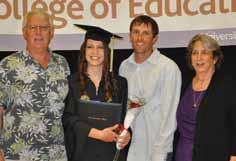
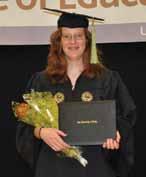

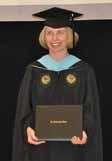
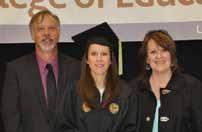
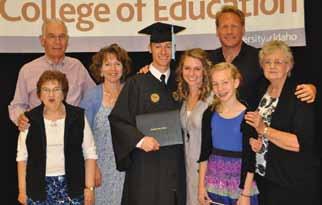
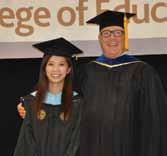
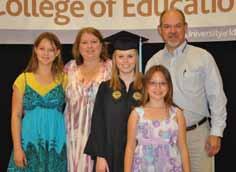
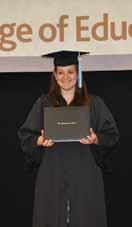

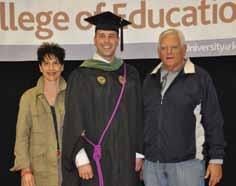
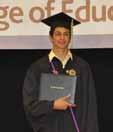
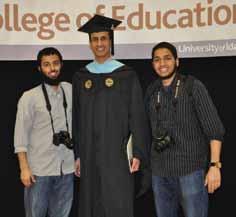
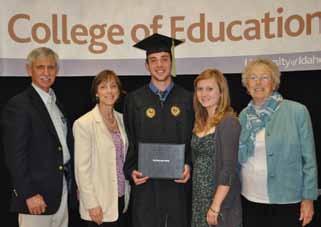

ALUMNI Fall 2012 15
He’s gone the extra mile
Minico’s Perrigot is at the Head of the Class
By Ryan Howe
Tim Perrigot begins his 196-page dissertation with the words of Knute Rockne: “Football is a game played with arms, legs and shoulders but mostly from the neck up.”

For 20 years in coaching, Perrigot had a hunch that quote was true.
Now after completing his doctoral research for the University of Idaho on the topic, he’s 100 percent convinced.
“There is absolutely a relationship between academic achievement and athletic success,” said Perrigot. “You use qualitative research not to identify a relationship, but to study that relationship. I found that athletics and activities are important and there are academic benefits associated with extracurricular participation.”
Perrigot recently completed his doctorate in educational leadership, making him the only current head football coach in Idaho who has earned the title “Dr.”
“That’s because most guys who are doctors are not stupid enough to be coaching still,” Perrigot joked.
Ryan Howe/Times-News
ALUMNI 16 envision
5insights from Minico football coach Tim Perrigot’s doctoral research, “Gridiron and Grades: Perceptions of Championship Coaches on the Relationship Between Academic Achievement and Athletic Success:”
• “I learned promoting academics in a school setting is the responsibility of many, especially parents, coaches and teachers. Community support is extremely important.”
• “We should encourage participation in activities knowing significant benefits associated with academic outcomes.”
• “We need to celebrate the academic successes of our athletes and provide academic support for student athletes with deficiencies.”
• “We should continue to study championship coaches and teams to better understand the relationship between athletic success and academic achievement.”
• “A large physical fullback and a quarterback with a cannon arm can win you a few games.”
Perrigot traveled throughout the Northwest to study five football programs that have achieved a state championship plus an academic state title in the same season. His findings form the core of his dissertation, titled, “Gridiron and Grades: Perceptions of Championship Coaches on the Relationship Between Academic Achievement and Athletic Success.”
At first glance, the five schools seem to have little in common. They range in size from their state’s highest classification, to the lowest. Some are private, others public. They are economically diverse.
But Perrigot discovered all shared the same traits.
“The championship coaches described the individuals on their championship teams as competitive, responsible, disciplined, driven, highly motivated, and intelligent individuals,” Perrigot said. “These athletes led by example, showed significant pride, held teammates accountable, and were able to adjust on the fly.”
In addition, these teams elevated the entire school.
Perrigot, who is also the principal at West Minico Middle School, had several motives to earn his doctorate, which took him about four years to complete. The son of teachers, Perrigot has always felt education was important. He was also inspired by his college football coach, Dr. Carl “Duke” Iverson at Western State College in Gunnison, Colo.
But most importantly, he hopes to set an example.
“I think it’s important that I send the message to my own children and to the kids I’m coaching that you need to be educated,” Perrigot said. “It’s valuable.”
Not only is the doctorate a high personal achievement for Perrigot, the wider implications of his doctoral research can be valuable to all coaches, teachers, athletes, administrators, school boards and communities.

“The teams consisted of good citizens who were leaders on the practice field and in the hallways of school. These teams raised the bar for the overall program,” Perrigot said. “It’s basically their school. They’re making the difference in the classroom and on the field and it’s contagious. The rest of the student body feeds off that.”
While Perrigot’s research focused on football, he said the implications apply to all sports and activities.
Armed with this research, will Perrigot lead Minico to state championships on the field and in the classroom? Perrigot acknowledged those are his goals; however, no single magic formula exists to make it happen.
Instead, the doctor-coach has gleaned ideas from his research that will hopefully garner similar results.
“I think I’ll be a better football coach today than I was, and I think I’ll be a better administrator because I better understand the relationship between academic achievement and athletic success,” Perrigot said.
Reprinted with permission from the Twin Falls Times-News
Fall 2012 17
By Cheryl Reed-Dudley
Overcomers Alumni Joe and Cindy Grover of Caldwell Have Learned the Measure of Success
The third grade students at Wilson Elementary in Caldwell are perfect, according their teacher, Joe Grover. Well – maybe not perfect, but the perfect age to still love school and get excited about it. That’s why Joe loves teaching them. “Third grade is my favorite grade because you can watch them grow,” says Joe.
Joe’s wife, Cindy, teaches the blind and visually impaired students in the Caldwell School District. She worked as a rehabilitation instructor for about 13 years, and then earned her master’s degree in blind rehabilitation instruction with an endorsement to teach the visually impaired. Joe has been teaching in Caldwell for 14 years.
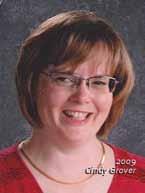
Cindy and Joe met in Boise at a training program for the visually impaired before attending the University of Idaho, where they were married and where they both received their education degrees in 1989.
Their unique challenges – Joe and Cindy are both visually impaired – brought them together.
“I only have a small amount of vision in one eye,” said Joe. “When I was about 7 or 8 years old and in the first grade, I developed a virus that damaged my optic nerve.”
Joe’s classroom in Caldwell is uniquely adapted to his teaching style, including a closed-circuit computer and magnification technologies that help him see. With the virus, Joe lost his central vision, which is used for close-up work.
“Peripheral vision is used for mobility,” he said, “so I get around pretty well, it’s the close-up work that I struggle with. So all of the magnification technologies that I use are really helpful. The blessing I have in all this is that I have a really good memory and rarely have to go back and re-read anything. Once I’ve read through something, I know it.”
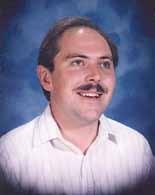
ALUMNI
Cindy Grover
Joe Grover
“I have learned that success is to be measured not so much by the position that one has reached in life as by the obstacles which he has had to overcome while trying to succeed.”
—Booker T. Washington
18 envision
Drawn to Teach
Joe grew up in St. Anthony, Idaho, where his parents stressed the importance of a good education.
“I grew up in an agriculture family, but a career in agriculture was not an option for me,” said Joe. “Because my parents put such an emphasis on education, it really seemed like becoming an educator was the logical step. They completely expected me to become educated. And I think that I wanted to be a teacher as long as I can remember.”
So Joe decided to attend the University of Idaho and get his degree in education.
U-Idaho College Life
But college life was not “fun” for Joe.
“I had to work pretty hard to keep up and get through,” he said. “But professors in the College of Education stuck by Cindy and me every step of the way. They were helpful, trusting, supportive, and reasonable about everything. And through the accommodations and adaptations we had to have, they still held us to high expectations. I have great memories of all the professors.”
One of Joe and Cindy’s contacts at the University of Idaho was Sally Greene, who was working on her master’s degree at the time. Sally is now the Director of Field Experience in the College of Education, but back then she was a mentor to Joe and Cindy.
“This was before a lot of books were on tape, so I recorded many of their books onto a tape recorder for them, and read tests and wrote answers for them,” said Sally. “This quickly grew from a working relationship into a friendship. I would take them grocery shopping, help them study, and even took them to vote.”
Sally says she was impressed with Joe and Cindy’s resiliency, positive attitude and determination.
“I must admit, I was a little skeptical of their desire to go into teaching, just because of the classroom management aspect,” said Sally. “So I was very pleasantly surprised when I heard a few years later that they had not only finished their degrees, but that Joe was a highly successful classroom teacher.”
Joe and Cindy both graduated in 1989. Joe began his teaching career in Wilder, Idaho, and Cindy worked as a rehabilitation instructor before they moved to Caldwell.
A Meeting Down the Road
When Sally was hired in the College of Education, she reconnected with Joe and Cindy. Sally’s job is to place preservice teachers with mentors in classrooms, and last fall she
placed University of Idaho education student Emily Groff in Joe’s classroom.
“It was a great experience for both of them and I was very pleased to see that they had decorated their end of the hallway in Vandal colors to help offset the blue and orange that dominated the rest of the building,” laughed Sally.
“Emily was my 20th student-teacher, but my first from the University of Idaho,” said Joe. “She was fantastic. She was fortunate enough to be hired at our school because she graduated in December and we had a huge overflow of fifth graders and were adding another class. Emily was hired to teach fifth grade.”
Joe said that being a mentor teacher is really rewarding.
“It’s fun to watch them develop their own practice,” said Joe. “It is really satisfying to give them the opportunity to stand up in front of the classroom and start implementing the best practices they’ve studied.”
But there was an extra-fun element to mentoring Emily.
“We had a great time because there are only eight or nine true Vandals in our school,” said Joe. “So we decorated the hallway with Vandal swag.”
Why Become a Teacher?
Joe’s life philosophy is summed up in a quote by Booker T. Washington: “I have learned that success is to be measured not so much by the position that one has reached in life as by the obstacles which he has had to overcome while trying to succeed.”
Joe wants to encourage students with disabilities to follow their dreams in spite of the obstacles.
“The struggles of getting through the process are truly worth the effort,” he said. “Over the years there have been a lot of trials for me. It wasn’t always the prettiest. Not everyone liked me or wanted me to have a chance, but overcoming the obstacles is important. I want to encourage students to follow their dreams and know that the field of education historically changes regularly. Even though things may seem difficult now, it won’t stay that way forever. Just hang in there.”
Joe also thinks that the University of Idaho is the place where future teachers should study.
“The U of I is the ultimate college experience,” said Joe. “I wish we could have stayed in Moscow, but the school district can only hire so many teachers!”
Fall 2012 19
Milken Award Recipent Brady Dickinson
Principal Brady Dickinson was told that the Idaho Superintendent of Public Instruction was planning to stop at the high school for a Veteran’s Day ceremony. But that wasn’t the whole story. Dickinson, who is principal of Canyon Ridge High School in Twin Falls, ended up planning his own awards ceremony. Luna was actually coming to Twin Falls to present Dickinson with a prestigious award – The Milken Educator of the Year.
Dickinson was caught off guard when the award was announced – an honor that comes with an unrestricted $25,000 award. Dickinson was honored for his visionary leadership, use of data to guide instruction and ability to raise student achievement, Superintendent Luna told Canyon Ridge students, school employees, and elected officials at the assembly.
Dickinson is one of about 40 educators around the country to receive the award this year from the Milken Family Foundation. Only 13 school employees in Idaho have been honored with it since the state joined the program in 2003.
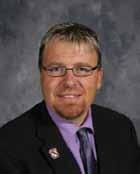
Why He was Chosen
As the first principal of Canyon Ridge High School, Brady finetuned the school to stay in line with the community’s needs by conducting a yearlong study on poverty’s effects on the at-risk student population’s performance.
Advanced placement student enrollment has more than doubled during Dickinson’s tenure at Canyon Ridge, while 24 percent of English language learners moved up one or two levels on Idaho’s English Language Arts exam. Students’ proficiency in reading also rose 2.3 percent on the Idaho Standards Achievement Test.
No stranger to leadership opportunities and teamwork, Dickinson led a team effort to form the district’s new high school, the second of two in the district. This included creating a new schedule and staffing plan. For this, he received an Extra Mile Award from the Twin Falls Area Chamber of Commerce. Dickinson is a former president of the Twin Falls Education Association and has served as one of its state delegates. He is also a former athletic director and coach.
About the Award
The Milken Educator Awards are the nation’s pre-eminent teacher recognition program, having honored more than 2,500 K-12 teachers, principals and specialists coast to coast with more than $63 million in awards. A total of $137 million has been devoted to the overall program, which includes powerful professional development opportunities throughout the recipients’ careers in education. Awardees are heralded in early to mid-career for what they have achieved … and the promise of what they will accomplish in the future.
The Milken Educator Awards were launched by education reform leader Lowell Milken to celebrate, elevate and activate exemplary K-12 educators. For a quarter-century, the Milken Educator Awards have been instrumental in communicating to parents and policymakers the proven fact that the quality of the teacher in the classroom is the most important school-based factor in determining student achievement.
Unlike most teacher awards, this program has no formal nomination or application process. Every participating state’s department of education appoints an independent blue ribbon committee to recommend candidates according to strict criteria, with final selections made by the Milken Family Foundation.
ALUMNI
20 envision
Erin Lenz ’01, first grade teacher in Coeur d’Alene, was named the 2011 Idaho Teacher of the Year – the sixth Coeur d’Alene teacher to win the award since 1999. The announcement was a surprise for Lenz, who received $1,000 from the Idaho State Department of Education, $16,000 in technology from the SMARTer Kids Foundation, and an allexpense-paid trip to Washington, D.C., to represent Idaho as a nominee for the National Teacher of the Year.
Idaho superintendent of Instruction Tom Luna made the trip to Coeur d’Alene from Boise to make the surprise announcement during a school-wide assembly at Winton Elementary School.
Richard Cooper ’61
College of Education alumni and president and founder of the Tucson Country Day School, received the Arizona Charter Schools Association 2011 Lifetime Achievement Award. After nearly 50 years in education, Cooper has had a positive impact on many Arizona students and has earned the respect of the local community and national leaders. “Every child deserves to succeed and reach one’s own potential,” said Cooper. “The Lifetime Achievement Award is the culmination of my lifelong goal.”
According to the Arizona Charter Schools Association, the decision to present Cooper with the award was easy, considering the amount of time and effort he has invested in the charter movement. Cooper is only the second person in the last 16 years to receive the award, meant to honor a person who has dedicated his or her life and passion to the advancement of education.
Cooper opened Tucson Country Day School as a private preschool and kindergarten and Camp Adventure summer day camp in 1968. In 2000, he was one of the first to receive approval to open an Arizona charter school. The school started in 2000 with 43 students and today serves 681 students with 58 teachers and 101 staff. As a highly visible hands-on leader, Cooper attributes the school’s success to the high quality teachers and staff.
Cooper was also recently recognized by Newt Gingrich with the Arizona Entrepreneur of the Year Award. Speaker Gingrich visited the campus to see what makes Tucson Country Day School successful.
Marilyn DeLeve’ College of Education dean’s assistant
“A few days ago while rearranging my bookcase, I came across a small, fabric-covered book. I stopped my work and sat in my favorite chair and read every page. What a special gift! The little book was filled with messages from wonderful graduate students covering a long period of years and locations far and near.
“It was truly a blessing to have had a position in the College of Education [as dean’s assistant] for 25 years, where I could be of assistance to wonderful students who came to Moscow from all over the United States and from Ecuador, Japan, China, Saudi Arabia, Canada, Tanzania and the frozen north of Alaska. Not many people have such an opportunity.
“Each of you students were very special to me, and if you are reading this, I hope life has been kind to you and that you, too, have fond memories of the outstanding faculty who served you in this wonderful College of Education, University of Idaho.
“Thank you so much for the memories – they mean so very much!”
Marilyn DeLeve’, 1326 Tamarack Dr., Moscow, ID 83843
Barbara L. Grant ’04 of Boise received the 2011 award from the American Medical Writers Association for the best consumer health publication. The book she coauthored is titled “Complete Guide to Nutrition for Cancer Survivors.” Barbara is the outpatient clinical nutritionist at the St. Alphonsus Cancer Care Center in Boise and is a board-certified specialist in oncology nutrition. The book, published in 2010, is written for consumers, patients, and families seeking reliable information about nutritional support for people with cancer. “Pretty wonderful for a Vandal,” she said. boisegrant@msn.com

ALUMNI NOTES Fall 2012 21
Dorothy Seney MacPhee ’68
, of Coeur
d’Alene and Yuma, Ariz., reports that she has three sons who are all University of Idaho graduates: Craig, John, and Glen. Not only that, four of her ten grandchildren are University of Idaho graduates, and her ten great-grandchildren are all “future grads.”
Eric Mann ’11 was offered a professional opportunity of a lifetime – in more ways than one. He completed his student teaching in Sandpoint in professional technical education in December and was immediately hired to teach there permanently. Just a short time later, he was selected to serve on a committee for the U.S. Department of Education as a non-federal negotiator representing postsecondary students. The committee’s job is to determine standards and regulations for teacher preparation programs throughout the nation.
Sandpoint high school principal Becky Meyer, also a U-Idaho alumna who recently earned her doctoral degree, nominated Eric for the position.
The committee is made up of approximately 20 university presidents, college of education deans, private university interests, financial aid officers, and two practicing teachers, including Eric. The committee was formed as a reaction to the lack of self-regulations from teacher preparation programs and to establish financial support. “It’s a very specific position with a very widespread impact,” said Eric.
Eric flew to Washington, D.C., in January to attend the first of three committee sessions. The focus of the meeting was directed toward providing input for the Department of Education to write draft regulations for negotiation at future committee meetings. The committee is also working to better define what constitutes a high quality teacher preparation program.
“We discussed methods for reducing reporting burden while increasing validity and consequence to assist in providing a continuously improving teacher force,” said Eric, who returned to D.C. in February and again in April for more meetings.
Chris Naccarato ’02, “I am celebrating my 20th year of teaching and launching rockets this year, and have a very special astronaut event planned. This year will mark my 24th astronaut to visit, and I have done every program that NASA has done except one – Gemini. It has taken me three years to chase one of those astronauts down, but have had success and will complete that goal this year. It has been my goal as a teacher of making history come alive with my students. I hope to one day look back on that goal and feel that objective was accomplished. I am very proud to be a U of I alumnus, and I have always appreciated the big support that the U of I has given me.”
Lynda Cochran Sperazza ’05 is now an associate professor and graduate program coordinator in the Department of Recreation and Leisure Studies at the College of Brockport, in the State University of New York system. Sperazza’s research line continues in programming specializing on the effect of the baby boomer generation on leisure needs.
Andrew T. White ’10 of Boise opened the doors for Concordia University School of Law in Boise – the first law school to be built there. His dissertation examined law schools and community engagement. He also has a second home in Seattle and enjoys Puget Sound. “Great place to write journal articles!” he says.
Jessica Shawley ’08, Moscow Junior High P.E. teacher, has won the National Middle School Teacher of the Year award. Jessica was a Wright Fellow in the College of Education and earned her master of education degree there. Congratulations to Jessica!
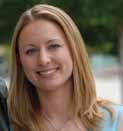
ALUMNI
22 envision
Inspiring Futures
The most ambitious campaign in University of Idaho history launched on April 28, 2012 in the Kibbie Dome. Hundreds of guests celebrated the launch of the campaign, named “Inspiring Futures: Invest in the University of Idaho” in the newly-renovated Kibbie Dome.
The $225 million effort will guarantee that the University of Idaho is positioned now and in the future to continue to offer internationally competitive education programs while also driving Idaho’s economic prosperity and addressing the most compelling issues of the day.
“We are positioning the University of Idaho for an unprecedented century ahead,” said President Nellis. “Our first 123 years was just the beginning. To reach our next level of success requires substantial private investment.”
The quiet phase of the campaign began in 2007. Since then, 28,403 donors have made gifts totaling $161.8 million –more than halfway to our goal. This early success shows the commitment of our alumni and friends.
For more than 123 years, the university has inspired futures. From the first class of 40 students to the more than 12,000 enrolled now, the future of each member of the Vandal Family has been inspired, challenged, and has ultimately contributed to our legacy of success and leadership.
We don’t take our ability to inspire lightly, which is why this campaign is a robust effort to shore up four important
$162 M
cornerstones: catalyzing student success, leading innovation and discovery, creating distinction and impact through partnerships, and building a worldclass learning environment.
As a major research institution, the University of Idaho has more than 250 sponsored research contracts, employing nearly 70 percent of our undergraduate students in research and scholarly activities. We now have the largest number of National Merit Scholars in the Northwest: 17 new enrollments that total 74 scholars. Boise State enrolled one.
College of Education Campaign Goals
The College of Education’s campaign goal is $6 million. To date, it has raised $4.2 Million.
Alumna Gail Hanninen (’66, ’74) is one of our donors. She established an endowed faculty excellence fund to recognize and reward faculty members who have established a record of excellence in teaching and research in all disciplines within the College of Education. The Gail Hanninen Faculty Fellowship Endowment specifically assists leading faculty whose research is applicable to current issues within Idaho that can also be applied nationally. The faculty fellowship can also be used to recruit promising new faculty positions.

“How can we ask someone else to invest in our work if we don’t make our own investment in it?” asked Gail. “I am so passionate about our work at the U of I that I want to do my part to demonstrate that our work is meaningful, relevant, and valuable.”
To read more about the campaign and how you can give, visit www.uidaho.edu/ed and click on Inspiring Futures.
“How can we ask someone else to invest in our work if we don’t make our own investment in it?” asked Gail. “I am so passionate about our work at the U of I that I want to do my part to demonstrate that our work is meaningful, relevant, and valuable.”
Fall 2012 23
Donor Gail Hanninen
C&I Curriculum and Instruction
Ernie Biller Makes the Transition to UI Professor Emeritus
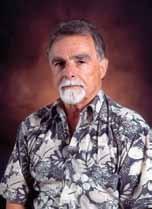
Ernie Biller, faculty member in the Department of Curriculum and Instruction, retired in May 2012.
After several years on the teaching faculty at the Ohio State University, Biller joined the University of Idaho in 1992 and was tenured in 1995. Ernie’s original home department title (and office) in the College of Education changed several times over the last decade, but his primary role was always to prepare teachers and counselors in the skills of career guidance. Over the last decade he also served as coordinator of the counselor education program, first in the Coeur d’Alene area, and later as the statewide coordinator. Until recently, Ernie had served as coordinator for the Career and Technical Education program, which is now housed in the Department of Curriculum and Instruction.
Ernie’s new office, beginning in May, is on the second floor of the College of Education building, just a few doors down from the very first office he occupied upon his arrival in 1992.
“I’m looking forward to getting the concentrated time to finish my sixth book on career guidance, which will have a focus on the historical aspects of my discipline,” he said.

Ernie reminisces about his time at the University of Idaho:
I would like to start with a fond and humorous moment my very first week on campus. Like any new faculty member, we all want to make a good impression on our college administrators, particularly our department chair. My first department chair was Jerry Tuchscherer, who is now retired. I can honestly say that by far Tuchscherer was the best department chair any new faculty member could have – but I got off to a very awkward start with him when I made the misguided decision to appeal a $15 parking ticket that I got my first day on campus. As part of the appeal process it was necessary to appear before the parking committee to state your case as to why you should have the ticket waived.
The first Monday following my first week on campus the parking committee met, so I showed up and waited to be called to make my case. As I entered the room I looked on in sheer horror as seated at the head of the appeal committee table sat my brand new department chair, Jerry Tuscherer.
It felt like my knees were buckling beneath me, and everything that I thought I would say in my appeal evaporated into thin air. I was so embarrassed to be bringing such a trivial matter as a $15 parking ticket to my new department chair. To this day I don’t even remember what happened to my appeal, only that I would never again appeal a UI parking ticket.
Before making a formal job application to the Department of Adult, Career, and Technology Education at the University of Idaho, I called Tuchscherer’s office and talked with his administrative assistant, Cary Manry. I mentioned to Cary that I wasn’t sure from the advertisement if this position was a tenure track or not, as I was sure I would not be interested in applying if it was not. To my surprise Cary said, “well I am not totally sure, but we can probably make it one if it isn’t.”
Initially, my main role in the department was to help the state division of Professional and Technical Education and the UI in teaching and promoting career guidance throughout the state. I taught more classes off campus than on campus, traveling weekly to Twin Falls, Boise, Lewiston, and Coeur d’Alene, where
DEPARTMENT AND CENTER NEWS
24 envision
I met most every professional technical teacher and counselor in the state who had responsibilities for career guidance. I was on the road 90 percent of the time for the first five-seven years, but I enjoyed it immensely as Idaho is a beautiful state and I have always loved driving through it. Fortunately, I already had enough grants and publications before I got here to get me through the tenure and promotion process, otherwise I never would have had time to do the necessary research and writing to achieve that goal.
Along the way, I have served three times as the president of the Idaho Career Guidance Association and once as the president of the Idaho Career and Technical Educators Association. Four people that stand out in support of me in all these undertakings were Jerry Tuscherer, who always supported me and my efforts no matter how stubborn I would become if I had a objection to some policy or event, Jim Baxter, who to this day remains my close friend and is still a major player in Idaho’s career and technical education arena, Jerry Fischer, who had faith in my abilities to lead UI’s counselor education program during its leanest years, and Andy Hanson, who had the courage to allow me to lead him in completing his master’s and doctoral degrees as well as to remain my close friend and constant lunch buddy.
What Now?
I believe in the saying “time flies when you’re having fun.” The elimination of my home department a few years ago did put a damper on my job being “fun,” but the transition has been smooth and I can truly say that career and technical teacher education is as strong as ever and is on the way up in every respect, thanks to a very supportive department chair, Paul Gathercoal, and a core of very vibrant and productive career and technical educators now being superbly led by John Cannon.
If I were to write my memoir, I’d say that life begins at retirement. I’ve had more fun traveling abroad these last three years, just enjoying life. If you’re paying attention to your life, you’ll develop wisdom – the kind that comes from seeking the advice of others, learning from mistakes, and working hard. And I am truly enjoying the fruits of my labor. It was Dr. Jerry Fischer that taught me to understand and appreciate the true meaning of “embracing a multicultural world” a lesson that I not only never forgot but has also led to the forging of a new lifelong relationship with a significant other from this multicultural world.
Deanna Gilmore Retiring at Home on the Palouse

If you ask Deanna Gilmore about her teaching career, she might tell you that she’s learned more from her students than she’s ever taught them. But that’s because she’s humble – a characteristic and quality that she exudes. It’s also because the things a teacher learns from a student are usually deeply personal and have a way of changing the way he or she views the world.
After five years of teaching at the University of Idaho, Deanna is retiring, although she will continue to teach some online courses. Her experience and expertise in children’s literature at the University of Idaho are just a short snippet of her teaching career, which began back at Eastern Washington University, where she taught speech while she was an undergraduate student earning her education degree. She loved teaching and dreamt of becoming a college professor one day – a dream that came true for her many years later.
Northern Lights
Deanna grew up in Plaza, Wash., a town of 56 people, where her father was a wheat and pea farmer. She attended a small two-room school and studied with older children. When she was 14 years old, her family moved to Spokane, where Deanna attended an all-girl Catholic high school, and where she “learned all the official minor things in life.” After high school, she attended an all-girl college for two years before transferring to Eastern Washington University.
After she was married, Deanna and her husband, whom she met at EWU, moved for a time to Orange County, Calif., then to Bellingham, where her husband attended Western Washington University.
“Then one day my husband came home and said to me, ‘let’s move to Alaska,’” said Deanna. “He said that we could make enough money to come back and buy a house. We decided to try it out for just a year, but we fell in love with the people.” Fascinated with native Alaska life, they stayed there for five years and had three children.
“It was the highlight of my life,” said Deanna.
Fall 2012 25
DEPARTMENT AND CENTER NEWS ETHICS
When the Gilmore family moved back to the states, Deanna considered being a homemaker while her children were growing – but quickly realized how much she loved teaching. She told her husband she wanted to go back to Alaska and teach again.
“We went back for three more years and had our fourth child there,” said Deanna. “Our fourth baby was born at home because the weather was too bad to make it to the hospital. It was a really memorable experience.”
From Alaska, the family moved to Okanogan, Wash., where they taught on the Omak Indian Reservation at Paschal Sherman Indian School. After Omak, they moved to eastern Montana, where Deanna’s husband worked for U.S. Customs and where Deanna taught and was an elementary school principal. They were there for 12 years.
“Then one day my husband came home and asked if I wanted to move to Ireland,” laughed Deanna. “He had been offered a job there. So we moved there for two and a half years.”
Turning Corners
When they finally moved back to the U.S., Deanna wasn’t sure what she wanted to do next. “My husband suggested I go back to school to get a doctorate,” she said. “So I attended WSU in Pullman and taught children’s literature there for three years.”
After earning her Ph.D., Deanna taught at WSU Tri Cities for four years. When her mother became ill and went into a nursing home in Spokane, Deanna wanted to be closer, so she applied for a teaching position at the University of Idaho College of Education. She got the job in 2007 and quickly became a favorite professor by education students.
“Being at the University of Idaho has been wonderful,” said Deanna. “I really connect with the students here; I think I relate to them because I’m from a small town.”
Deanna takes some good memories with her, not just of her students, but also of two special awards she received: Professor of the Year by Gamma Phi Beta, and an Academic Excellence award in 2011 for being an inspirational mentor to Frances Hall, an outstanding undergraduate student at the U-Idaho.
Deanna wants to continue teaching online courses until she doesn’t feel effective anymore. She also wants to continue oil painting and visiting her grandchildren – and she would like to take classical piano lessons and write a unique children’s book.
Deanna’s lifetime accomplishments exemplify the rewards of risk-taking. She’s never been afraid to challenge the status quo, take on interesting challenges, or do what it takes to be a good teacher. No doubt, her retirement years will be as colorful as her teaching career.
The Center for ETHICS* and The World Anti-Doping Agency (WADA) are working on a collaborative education project titled “Competing with Honor: To Dope or Not to Dope.” One of the project goals is to educate high-level athletes on the value of competing drug free. Upon successful completion of the initial project, the course will become part of WADA’s educational curriculum.
If you would like to have your athletes participate in the project, contact Professor Sharon Stoll at sstoll@uidaho. edu. Teams currently participating include the Idaho Vandal women’s soccer team and the Washington State University Cougar men’s basketball team.

Students
Doctoral candidate Clinton Culp defended his dissertation “The pedagogy of moral reasoning of U.S. Marine Corps lieutenants while at The Basic School” on Monday, April 23, 2012. Clinton is Professor Sharon Stoll’s 21st completed doctoral student.
Major Paul Ovalle, USMC, was in attendance representing The Basic School in Quantico, Virginia. Ovalle was the Company Commander for Fox Company, the first company to receive The Center for ETHICS* new character education curriculum and pedagogy.
Doctoral candidate Tom Grant (scheduled to complete this summer) has secured a teaching position in journalism with Abraham Baldwin Agricultural College, a state college of the University System of Georgia.
26 envision
Leadership and Counseling
Masters in Rehabilitation Counseling and Human Services
University of Idaho Boise Campus
By Beth Cunningham
I started working for the University of Idaho in January 2012 as the new half-time clinical faculty member promoting the master’s degree program in rehabilitation counseling. I am very excited to be a part of the launching of this new degree in Boise.
I have worked as a rehabilitation counselor in the Boise and Treasure Valley area since 1994. While the master of rehabilitation counseling program started in the 1970s in Moscow, it is brand new to Boise. One of the reasons we were able to begin offering the program in Boise is due to our relationship and partnership with the Idaho Division of Vocational Rehabilitation, IDVR. The agency employs 72 rehabilitation counselors in the state and has been very supportive in bringing this program to Boise, as well as several other rehabilitation agencies in the area.
We have an advisory board made up of rehabilitation professionals including Don Alveshere, Administrator of IDVR; Mary Barros-Bailey, a graduate from the program and owner of the private rehabilitation agency Intermountain Vocational Services; Sean Burlile, a graduate of the program and rehabilitation counselor with the Veteran’s Administration Vocational Rehabilitation program; Susan Stuntzner, professor of the Rehabilitation Counseling program in Coeur d’Alene; Russ Joki, College of Educational Leadership and Counseling Department chair at the Boise campus, and myself.
I began my career as a vocational evaluator in Denver, Colo., and moved to Boise in 1994 to work for IDVR as a rehabilitation counselor working with the school-to-work caseload. I later began working with Community Partnerships of Idaho and served as the employment services director for 12 years. In 2009, I began my own vocational consulting company, which I
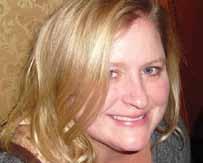
still maintain along with helping to launch this program with the University of Idaho in Boise.
In March of 2012, we had our first open house. The first introductory class was taught in April and is a prerequisite to the program. This summer marks our start with a new cohort of students in both Boise and Coeur d’Alene. While we encourage students to attend full time with the cohort model, we are also allowing open enrollment and will welcome part-time students if room is available in the program. For full-time students, the program is a two-year, 60-credit hour master’s degree.
We are excited to welcome our new tenure track professor, Bryan Austin, who began in August 2012. Bryan is a nationally certified rehabilitation counselor and comes from Michigan State University, where he will be receiving his Ph.D. in rehabilitation counselor education. Bryan has worked in rehabilitation for 15 years and has extensive clinical experience providing direct services to individuals with disabilities in a variety of practice settings in the fields of mental health, developmental disabilities, and vocational rehabilitation. His current research interests include: clinical judgment education, clinical supervision, professional identity of rehabilitation counselors, and outcomes for individuals with intellectual and co-occurring psychiatric disabilities.

L&C
Bryan Austin
Fall 2012 27
Beth Cunningham
Movement Sciences
Kathy Browder Heads for North Carolina
Movement Sciences Department Chair Kathy Browder is moving back near her roots with a new job she began this July. As Associate Dean of the Department of Health and Human Services at the University of North Carolina Wilmington, Kathy will be close to her family and about an hour from where she grew up. But that’s not the only reason she chose the job.
“It was a hard choice to leave the University of Idaho,” said Kathy, “but the more I read about the job in North Carolina, the more I saw it as a great opportunity.”
Kathy has been at the University of Idaho since 2001, when she was appointed as a faculty member in the Department of Health, Physical Education, Recreation and Dance. When Department Chair Cal Lathen retired in 2003, Kathy was poised to step in as interim chair. Part of her preparation had been an appointment to a university task force under then President Jon White.
“I learned about leadership and the university as an organization,” said Kathy. “I became convinced that I had the skills to be involved in administration.”
Kathy served as interim chair after Lathen left, then became permanent chair of HPERD in 2006. She has led the department through many changes, most importantly redefining the department to meet the challenges of the 21st century. She also helped lay the foundation for the department’s Healthy Active Living initiative and took strong steps to align resources and structures to support the initiative, including high quality education, outreach and engagement with the community.
“We began to define outreach and engagement to integrate into our scholarship and teaching,” said Kathy.
One specific example of the department’s outreach is the Safe Routes to School program, in which students, faculty, and community members have worked together to provide schools with the education and support structures for safe and healthy alternatives to get to school.
“We’ve also restructured our core curriculum to integrate community service learning projects,” said Kathy.
Kathy served as interim associate dean in the College of Education after Dean Rowland left, and helped provide stability and leadership for the College for two years through an important transition. This experience will no doubt help in her new role in North Carolina.
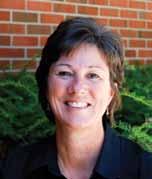

“I owe the University of Idaho a lot of gratitude,” said Kathy. “They invested in me and supported me.”
Dr. Michael Anthony Pickering, currently at West Point, has been hired as the new department chair. He will begin his work with the College of Education in January of 2013. Until then, Dr. Damon Burton is serving as interim department chair.
DEPARTMENT AND CENTER NEWS
28 envision
Kathy and Russ Joki, former chair of the Department of Leadership and Counseling.
Nez Perce Tribe Local Education Funds at Work in Partnership with Clearwater Valley Upward Bound
By Michael Highfill
Over the course of the past two years, the Clearwater Valley Upward Bound, or CVUB, project at the University of Idaho has enrolled 47 low-income, first-generation high school students in college courses utilizing local education funds secured through our partnership with the Nez Perce Tribe. Students were enrolled in a range of core curriculum courses, including English 101 and 102, Psychology 101, Sociology 101, Anthropology 101, Music History 101, and Political Science 101.
Students enrolled in courses through CVUB received extensive support services in order to ensure their success. These support services included, but were not limited to: academic tutoring and advising, mentoring, and guidance in accomplishing their postsecondary education goals. Each student received approximately 120 hours of support from CVUB staff members


as they worked to complete their course(s), and earned an average grade of B-. In fact, some students were able to complete an entire semester of course work (12 credits) prior to enrolling in their freshman year of college.
A significant body of research has demonstrated the positive impact of successful student participation in early enrollment in college courses. According to Dr. Joni L. Swanson at the University of Iowa’s College of Education, early enrollment students are more likely to enter college within seven months of high school graduation and more likely to persist through the second year of college than non-participating students.1 Students who participate in dual enrollment are required to take fewer core courses upon enrollment in college and will, therefore, have less of a financial burden. In addition, students who successfully complete these so-called “gatekeeper” courses early are much more likely to persist in college.
In total, students enrolled through this partnership have completed 150 college credit hours thus far, and program staff has logged over 5,600 service hours in support of these students. Furthermore, students enrolled through the partnership have gone on to enroll in a program of postsecondary education in the fall directly following high school graduation at a rate of 100% – this coming from high schools with an average college-going rate of 30%. These students have enrolled at such institutions as Lewis Clark State College, University of Idaho, Washington State University, Baylor University, and Northern Arizona University.
TRiO
Fall 2012 29
1. An analysis of the impact of high school dual enrollment course participation on post-secondary academic success, persistence and degree completion (executive summary), Dr. Joni L. Swanson, the University of Iowa, College of Education, May 2008.
DONORS
John and Karen Rosholt
Higher Ed Donations = Good Teachers
= Smarter Citizens = Less Crime
By Cheryl Reed-Dudley
John Rosholt (Law ’64) and Karen Rae Fisher Rosholt
(Education ’64) have been longtime loyal supporters of the University of Idaho. The couple has designated $25,000 to support elementary education students who are pursuing a degree at the University of Idaho. Their gift will be used to support students attending the University during the 20122013 school year, making their gift immediate and impactful.

30 envision
“My wife and I were interested in supporting aspiring primary school teachers,” said John.
“If we have more money for good teachers, we wouldn’t need so many lawyers,” (referring to a well-known statistic that better-educated populations have fewer criminals).
Karen is a retired special education teacher and John is an attorney in Twin Falls. John was awarded the Idaho State Bar Association’s 2004 Distinguished Lawyer Award, and in 2008 was awarded the University of Idaho’s Faculty Award of Legal Merit. In addition to their ongoing financial support of the university, the couple established the John A. Rosholt Roundtable for Visiting Professionals in the University of Idaho College of Law.
A Vandal History
Karen’s father, Merle Fisher, was recruited from St. Martins in Tacoma to play basketball for coach Rich Fox at the University of Idaho in the 1930s. After graduation, he returned to Port Angeles, married, and raised Karen and her siblings there. At the University of Idaho, Karen lived at Gamma Phi Beta until she graduated in 1964. Karen was very active on campus and served as vice president of the Associated Women Students in her senior year.
After Karen and John were married in 1966, Karen taught special education in Twin Falls until 1985, when she retired to be home for their daughters during their senior year in high school. The couple’s three children are all University of Idaho graduates.
In 1966, John was made a partner in Parry, Robertson and Daly – then one of the larger firms in the state with nine lawyers. His clientele and interest eventually pulled him to a niche in water resources, where he has represented irrigation hydropower and other water interests almost exclusively for 30 years. He also served as Idaho’s director to the National Water Resources Association for 18 years, serving as president of the 18 western state group in 1976.
“One of the most overlooked obligations of those of us who attended UI is to pay back,” said John. “The University of Idaho and the State made it possible for our lifetime successes. While we’ve participated in University of Idaho support in the past, a flier from the College of Education got our attention. We decided that good teachers build better and smarter citizens, so we decided to help in a small way as part of payback.”
For information about making a gift to the College of Education, visit uidaho.edu/ed or contact Christina Randal at cdrandal@uidaho. edu (208) 885-7537.
Your Gift
We believe the community of friends, alumni and supporters of the College of Education are what make us special.
Through collaboration and commitment to excellence, our work will positively impact generations to come and afford to others the same life-changing opportunities many of us have had. By supporting our work here, you become part of our legacy and will positively impact future generations.
If you would like to give to the Dean’s Excellence Fund, which supports faculty and students’ research and outreach, or a student scholarship fund, contact:
Christina Randal
cdrandal@uidaho.edu (208) 885-7537
Or visit our giving page online at www.uidaho.edu/giving
Fall 2012 31
LOOKING BACK
Edith Betts
By Cheryl Reed-Dudley
In Memory of A Generous, Inspirational Leader

Former College of Education professor Edith Betts died peacefully in her Salem, Ore., home on Thursday, December 13, 2011 at the age of 90.
From 1951 to 1983, Edith taught physical education at the University of Idaho, and is fondly remembered for her leadership, generosity, inspiration, and the impact she had on girls and women in sport.
Edith was highly respected on campus as well as nationally, and internationally. She served as chair of the Women’s Physical Education Department from 1968 to 1978, and taught undergraduate and graduate courses along with advising students until her retirement. She also founded the first class in ethics in sport, was a good listener, and frequently counseled others.
Edith served several professional local, national, and international organizations, including as president of the American Association for Health, Physical Education, Recreation and Dance; chairperson of the Inland Empire Board of Officials; governing board member for NW Women’s Extramural Sports Association; and Region 9 Association for Intercollegiate Athletics for Women representative. She was also very active serving on the basketball, softball, and field hockey rules and exam committees in the 1950s, and in the 1960s became an active delegate to the International Association for Physical Education and Sports for Girls and Women’s Congresses. In 1969 she was invited to present a paper at the Congress in Tokyo.
Some of her hobbies included field hockey, racquet sports, mountain climbing and swimming. She was also interested in the history of the Moscow area. Her leisure time was spent gardening and with her golden retriever dogs. In 1985, Edith moved to Oregon and enjoyed retirement until her passing. A memorial service was held on Thursday, January 5, 2012, in Oregon.
What her students had to say:
“She was a class act ... great teacher, motivator and a wonderful role model for physical education teachers. She was passionate about educating the physical as well as the total person and she truly was a people-person. When you were around her it was obvious that she not only cared for her students but all mankind as well.”
~Steven Cox
“My encounters with Dr. Betts were marvelous. I loved visiting with her. Always smiling. I started out majoring in P.E. before switching to Gen. Education with P.E. as my minor. She’s the one that steered me to go that way; 34 years of teaching later, I still love what I do!
~Sandy Racine (1978)
Oh my, what a loss!
She was in the P.E. Department when I was at Idaho from 1953-1957.
~ Virginia McDonald
Memorials can be forwarded to the Edith Betts Scholarship Fund at the University of Idaho Foundation, 875 Perimeter Drive MS 3143, Moscow, ID 83844-3143.
A Message from Edith
To all of you I say – do not mourn my passing as I believe deeply in the Lord and feel that I have gone to be with Him and with others who have gone before.
May his blessing be with each of you. ~Love, Edith.
32 envision
Julius Edward “Pete” Peterson has established scholarships in the College of Education and the College of Letters Arts and Social Sciences to help other first-generation college students pursue their educational goals. The first scholarships are being awarded in 2012, and Peterson plans to add to the scholarship endowments annually. His final gift to the endowments will be through a generous estate gift.
Peterson earned his bachelor’s degree in political science from the University of Idaho in 1962. He was highly involved in campus activities, including the NROTC. During his junior year, he received the Lambda Chi Alpha Leadership Award, and at his graduation ceremony, received the American Legion Navy Award.
Following graduation, Peterson was commissioned ensign in the Navy and served during the Vietnam era. He attained the rank of lieutenant and received several medals.
Peterson has a heart for first-generation college students. He understands the increasing financial challenges they face and is passionate about ensuring student success by helping future teachers graduate without high student loan debt.
With more students graduating with increasing debts, Peterson wants to do his part in making a difference, and inspiring the futures of the next generation of Vandal leaders.

For more information on giving to the College of Education, contact: Christina Randal Director of Development (208) 885-7537 cdrandal@uidaho.edu Impact tomorrow www.uidaho.edu/inspire Fall 2012 33
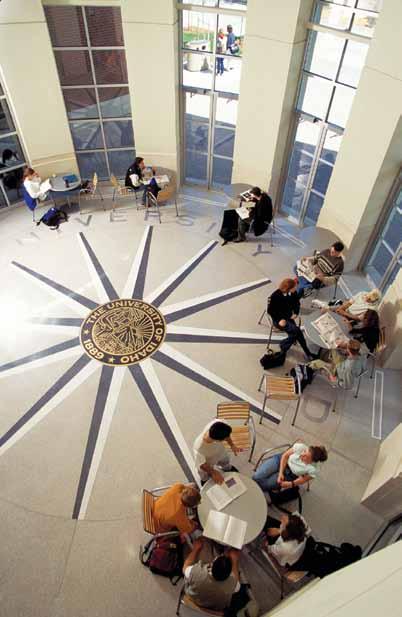
We Want to Hear From You! Name: Class Year: E-mail: Address: City: State: Zip: Telephone: Tell Us What’s New: Please send to: University of Idaho, College of Education, 875 Perimeter Drive MS 3080, Moscow, ID 83844-3080, or you e-mail Allison Stormo at: astormo@uidaho.edu. Nonprofit Org US Postage PAID Permit 679 Boise ID 875 Perimeter Drive MS 3080 Moscow, ID 83844-3080 *EAN200*
















 By Jamie Esler
By Jamie Esler










































